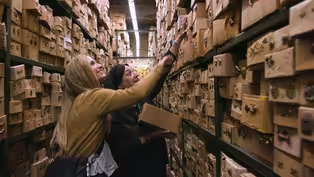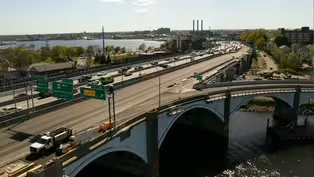
Senior Senator
Clip: Season 5 Episode 19 | 11m 31sVideo has Closed Captions
Rhode Island’s Senator Jack Reed says Israel needs new leadership amid the Gaza war.
Rhode Island Senator Jack Reed, Chairman of the Armed Services Committee, says Israel needs new leadership amid the war in Gaza. In a sit-down interview with Steph Machado, he also discussed efforts to get federal funding to build a new Washington Bridge on I-195.
Problems playing video? | Closed Captioning Feedback
Problems playing video? | Closed Captioning Feedback
Rhode Island PBS Weekly is a local public television program presented by Ocean State Media

Senior Senator
Clip: Season 5 Episode 19 | 11m 31sVideo has Closed Captions
Rhode Island Senator Jack Reed, Chairman of the Armed Services Committee, says Israel needs new leadership amid the war in Gaza. In a sit-down interview with Steph Machado, he also discussed efforts to get federal funding to build a new Washington Bridge on I-195.
Problems playing video? | Closed Captioning Feedback
How to Watch Rhode Island PBS Weekly
Rhode Island PBS Weekly is available to stream on pbs.org and the free PBS App, available on iPhone, Apple TV, Android TV, Android smartphones, Amazon Fire TV, Amazon Fire Tablet, Roku, Samsung Smart TV, and Vizio.
Providing Support for PBS.org
Learn Moreabout PBS online sponsorshipr Jack Reed,thank you so much for sitting down with us.
So you have been a strong supporter of Israel.
You're the Senate Armed Services Chairman, but you've also said that you believe the war in Gaza has in some ways veered off course.
You said in March, "Israel's strategy to defeat Hamas is in peril."
Would you at some point call for a ceasefire?
- I would hope there could be a ceasefire immediately.
We've been working very hard.
Secretary Blinken has been on the ground numerous times.
Bill Burns, our CIA director, has been involved.
There's negotiations between the Israelis, Hamas, facilitated by Qatar in many cases, but involving many other people.
There should be a ceasefire, and there should be the release of the hostages.
So I would do all we can to encourage such an agreement.
- And to be clear, are you talking about a temporary ceasefire or a permanent ceasefire?
- Well, I think the reality would be it's difficult to get a temporary ceasefire.
To get a permanent ceasefire would, I think, be politically very difficult for both sides.
So I think we have to hopefully use the ceasefire to get the hostages out, and then try to pursue some type of political solution, if possible, to get Hamas out of power in Gaza.
They're a destructive force as they've demonstrated.
And then further down the road, we have to think again about reconstituting a very vibrant two-state solution so that the Palestinian people and the Israeli people can live with stability and security.
- And do you think that solution requires the end of Prime Minister Netanyahu's government?
- I've called for Prime Minister Netanyahu's retirement on the floor of the Senate.
Netanyahu represents an obstacle to longterm peace in Israel.
My sense is that he did not realize the danger Hamas proved, presented to Israel, and in fact was using Hamas to destroy the Palestinian Authority and to enable a one-state solution, which he claims is the only solution he'll accept.
- Do you speak to Prime Minister Netanyahu, or when's the last time you spoke to him?
- The last time I spoke to him was about the middle of October after the attack.
We went on a delegation to Israel.
We understood the barbarity of the attack by Hamas.
And I think too many people are forgetting that now and shifting blame exclusively on or primarily on Israel.
This was a calculated barbaric attack by Hamas to create this dynamic of retaliation, and then to exploit the retaliation by saying, oh, look, they're killing innocent Palestinians.
This, we can't forget that, but I was there and I spoke to him.
And one of the things I tried to convey was that the way to conduct these operations requires precision, requires not brute force, but good intelligence, good operational techniques, and also you have to provide for the citizens who are caught up in this.
- Those have not been the techniques that we've seen.
Is that fair to say?
- Well, initially, I don't think they were at all prepared.
They were totally surprised, and they engaged out of, I think, the sense of fury and of existential terror that was created deliberately by the Hamas attack.
And they retaliated with airstrikes in areas without, I think, the most precise locations, because I think at that point that's all they really had.
And then they started a much more appropriate ground assault and try to go ahead, but they're dealing with an enemy that has no regard for the Palestinian people.
Hamas, you know, they're all about their own crazy ideology and also about destroying Israel.
- There have been protests at college campuses across the country, particularly in the Ivy League.
We had a protest at Brown University that did end peacefully.
We have not seen the same resolution at other colleges like Columbia.
What has been your reaction watching those protests in recent weeks?
- One of the fundamental rights in the United States is that you can express yourself, you can protest, but it has to be within the confines of the law.
It has to be respectful of other opinions.
And many times these protests go way beyond that.
They deliberately want to be provocative.
They deliberately want to damage facilities.
They put in danger other people, sometimes unwittingly.
For example, when you're occupying a critical space in a college, does that prevent fire and rescue apparatus to get to buildings that you have to have if you're trying to make sure everyone is protected?
So they have been excessive.
I must say, I think the Brown students conducted themselves in as thoughtful way as you can in that situation.
And President Paxson did a superb job of saying, I hear you.
Let's do something.
Let's do it orderly.
And again, I think that was a sign of very great leadership.
But the right to stand up and express yourself is part of what many people have given their life to defend.
- Some of the rhetoric that have been used at the protests, and there were also some picketers outside your office in Providence, have said that the US is aiding a genocide.
Do you believe that what is happening in Gaza is a genocide?
- No, I don't.
What I know is that Hamas in its original charter committed itself to destroy the Israeli people wherever they are.
So if there's genocidal impulses, it's certainly coming, I think, from Hamas.
I think as I've said repeatedly, that in order to conduct this operation that the Israelis have to be conscious of civilian casualties.
I think we've seen some improvements in their tactical operations.
So they understand they have to abide by the rules of warfare.
And they have to do much better in getting supplies into Gaza.
The United States is stepping forward.
We should, by the end of May, have a dock set up in northern Gaza and supplies coming by ship from Cypress, which would mean a significant influx of food and supplies.
We just passed in the Congress billions of dollars of the humanitarian assistance, which is gonna go out not just to Gaza, but also to Ukraine and other areas of the world.
- Closer to home, Reed has been involved in securing federal funding to demolish and rebuild the Washington Bridge on I-195 West, a key artery to Providence, which has been shut down since December due to a critical failure.
At a recent congressional hearing, Reed questioned US Transportation Secretary Pete Buttigieg about funding the project, as the estimated cost has soared to more than $400 million.
How much of this do you think the federal government will cover?
- As much as we can marshal, and that's our job, honestly.
The first step is to get this project under the auspices of the emergency funding for the Department of Transportation.
- Does that require an act of Congress?
- I think at this point we have to pursue that path.
There might be ways that we can look at administratively, and I know Secretary Buttigieg is looking at them right now, but we're preparing a multiple approach.
And then the question is getting the top line of the Department of Transportation, the budget number up as high as it can because then those funds become available.
In addition to that, we're looking at every federal program that's possible to help us out.
- Do you think the federal government could pay for all of it?
- I think we could try to get them, but right now, the federal government typically pays about 80% of every highway project.
So it's not a stretch to ask in this emergency for more than that.
But our highway funding formulas are very generous to the states, and we try to supplement those by specific funds that could go to Rhode Island.
- In an institution where seniority matters, Reed is the sixth longest serving US Senator, having been elected in 1996.
If he runs again in 2026, he would be 77 at the start of his new six-year term.
Do you think that you'll run for reelection?
- I work every day to prepare to run for reelection, yes.
That's the way I've always done it.
- When will you make the decision?
- At this point, I don't know.
I mean, my decision is to be the best senator I can be every day.
And I try.
It's just such a privilege to represent the people of Rhode Island.
And I say this very, I hope, humbly because I'm fortunate.
I have great colleagues.
I have people who understand, who care themselves, who will share with me their not just problems, but their suggestions.
And I feel very fortunate for that.
I'm a lucky person.
So, you know, I'm gonna keep charging around.
- Senator Jack Reed, thank you so much for the time.
- Thanks, Steph, very much.
- After our interview with the Senator,
Window on Rhode Island: Wolf E. Myrow
Video has Closed Captions
Clip: S5 Ep19 | 7m 1s | Inside a bead lover’s paradise. (7m 1s)
Video has Closed Captions
Clip: S5 Ep19 | 4m 52s | Ted Nesi discusses Sen. Jack Reed’s future and the cost of rebuilding the Washington Bridge. (4m 52s)
Providing Support for PBS.org
Learn Moreabout PBS online sponsorship
- News and Public Affairs

Top journalists deliver compelling original analysis of the hour's headlines.

- News and Public Affairs

FRONTLINE is investigative journalism that questions, explains and changes our world.












Support for PBS provided by:
Rhode Island PBS Weekly is a local public television program presented by Ocean State Media

